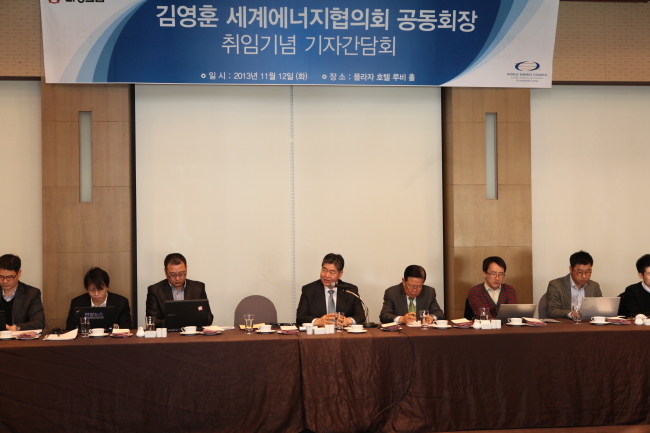U.S. shale gas boom to change Asian market
Shale gas revolution will lower price of LNG exports to Asia, says WEC cochair Kim
By Seo Jee-yeonPublished : Nov. 12, 2013 - 19:36

The shale gas boom in the U.S. will eventually turn Asia’s natural gas market from the current seller’s market to a buyer’s market, London-based World Energy Council cochair Younghoon David Kim said Tuesday.
“Leading gas sellers, including Russia, Australia and Malaysia, have started feeling the pinch as the U.S., once a gas buyer, is transitioning into a gas provider thanks to the recent shale gas boom,’’ Kim, who also leads Daesung Group, a Korean city-gas-driven energy conglomerate, said in a news conference.
“If the American shale gas revolution continues, big gas sellers will turn to new Asian big liquefied natural gas buyers like Japan and Korea, which will strengthen the power of Asian gas buyers in the gas trade,” he said. Japan and Korea are the world’s top two LNG buyers.
The power shift in the Asian gas market will lower the “Asian premium,” which refers to LNG export prices being higher for Asian buyers than for other regions.
The global gas market’s changing landscape was one of the most heated topics during the 22nd World Energy Congress in Daegu last month, Kim added.
At the press conference, which was held to review last month’s 2013 WEC in Daegu and to present his vision for the World Energy Council ― which hosts the WEC ― Kim said the Daegu event was successful in terms of quality and quantity.
“The event not only brought about 7,500 participants from the world, the largest delegation in its history, but it also offered attendants a unique chance to reach out to Asian energy leaders from such powerhouses as Korea, China and Japan,’’ the cochair of the world’s largest independent energy body said.
As the first Asian cochair of the council, Kim said he would serve the organization as a chief communicator and a chief facilitator for his three-year term between 2013 and 2016. He was also tapped to be sole chair for the council for three additional years after his term, between 2016 and 2019.
“Korean leadership for a bridging role has been welcomed in the global energy scene as Korea understands developing countries considering its fast-paced economic growth after the ashes of war,’’ he said.
“Representing a global energy body, I’d like to contribute to stability in the global energy price and balance between energy supply and demand by serving the body as a good communicator and coordinator,” Kim said.
At a regional level, he also assured that the council would create more opportunities for Asian energy leaders to discuss better exchanges and cooperation.
By Seo Jee-yeon (jyseo@heraldcorp.com)
“Leading gas sellers, including Russia, Australia and Malaysia, have started feeling the pinch as the U.S., once a gas buyer, is transitioning into a gas provider thanks to the recent shale gas boom,’’ Kim, who also leads Daesung Group, a Korean city-gas-driven energy conglomerate, said in a news conference.
“If the American shale gas revolution continues, big gas sellers will turn to new Asian big liquefied natural gas buyers like Japan and Korea, which will strengthen the power of Asian gas buyers in the gas trade,” he said. Japan and Korea are the world’s top two LNG buyers.
The power shift in the Asian gas market will lower the “Asian premium,” which refers to LNG export prices being higher for Asian buyers than for other regions.
The global gas market’s changing landscape was one of the most heated topics during the 22nd World Energy Congress in Daegu last month, Kim added.
At the press conference, which was held to review last month’s 2013 WEC in Daegu and to present his vision for the World Energy Council ― which hosts the WEC ― Kim said the Daegu event was successful in terms of quality and quantity.
“The event not only brought about 7,500 participants from the world, the largest delegation in its history, but it also offered attendants a unique chance to reach out to Asian energy leaders from such powerhouses as Korea, China and Japan,’’ the cochair of the world’s largest independent energy body said.
As the first Asian cochair of the council, Kim said he would serve the organization as a chief communicator and a chief facilitator for his three-year term between 2013 and 2016. He was also tapped to be sole chair for the council for three additional years after his term, between 2016 and 2019.
“Korean leadership for a bridging role has been welcomed in the global energy scene as Korea understands developing countries considering its fast-paced economic growth after the ashes of war,’’ he said.
“Representing a global energy body, I’d like to contribute to stability in the global energy price and balance between energy supply and demand by serving the body as a good communicator and coordinator,” Kim said.
At a regional level, he also assured that the council would create more opportunities for Asian energy leaders to discuss better exchanges and cooperation.
By Seo Jee-yeon (jyseo@heraldcorp.com)









![[KH Explains] Hyundai-backed Motional’s struggles deepen as Tesla eyes August robotaxi debut](http://res.heraldm.com/phpwas/restmb_idxmake.php?idx=644&simg=/content/image/2024/05/16/20240516050605_0.jpg&u=20240516155018)








